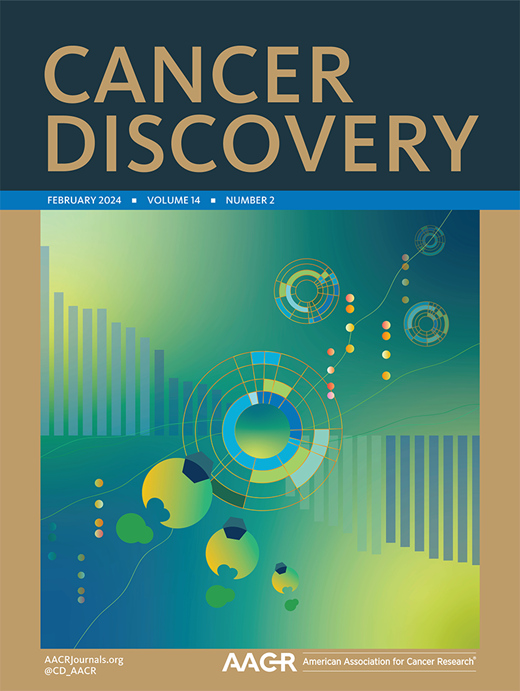染色体外dna驱动的癌基因剂量异质性促进mycn扩增癌的快速适应治疗
IF 33.3
1区 医学
Q1 ONCOLOGY
引用次数: 0
摘要
染色体外DNA (ecDNA)扩增通过其不对称的有丝分裂分离违反了遗传的基本原则,从而增强了细胞间癌基因剂量的变异性,加速了肿瘤的进化。聚焦高危神经母细胞瘤,我们展示了ecDNA扩增如何破坏当前治疗染色体外MYCN扩增癌症的临床疗效。将癌基因拷贝数依赖的适应性理论模型与单细胞ecDNA定量和表型分析相结合,我们揭示了ecDNA拷贝数异质性驱动表型多样性,并通过染色体癌基因扩增无法实现的机制决定治疗敏感性。我们证明了ecDNA拷贝数直接影响癌细胞系、患者来源的异种移植物和原发性神经母细胞瘤的细胞命运决定,说明了染色体外癌基因剂量驱动的表型多样性如何在治疗压力下提供强大的进化优势。此外,我们鉴定出ecDNA拷贝数减少的衰老细胞是神经母细胞瘤治疗耐药的来源,并概述了靶向消除它们以改善mycn扩增癌症治疗的策略。意义:ecdna驱动的肿瘤基因组进化为治愈性癌症治疗提供了重大挑战。我们证明,在mycn扩增的癌症中,ecDNA拷贝数动力学通过促进癌基因剂量依赖的表型异质性来驱动治疗耐药性。因此,利用ecDNA细胞的表型特异性脆弱性,提出了克服治疗耐药性的有力策略。参见科尔萨的相关文章本文章由计算机程序翻译,如有差异,请以英文原文为准。
Extrachromosomal DNA-Driven Oncogene Dosage Heterogeneity Promotes Rapid Adaptation to Therapy in MYCN-Amplified Cancers
Extrachromosomal DNA (ecDNA) amplification enhances intercellular oncogene dosage variability and accelerates tumor evolution by violating foundational principles of genetic inheritance through its asymmetric mitotic segregation. Spotlighting high-risk neuroblastoma, we demonstrate how ecDNA amplification undermines the clinical efficacy of current therapies in cancers with extrachromosomal MYCN amplification. Integrating theoretical models of oncogene copy number–dependent fitness with single-cell ecDNA quantification and phenotype analyses, we reveal that ecDNA copy-number heterogeneity drives phenotypic diversity and determines treatment sensitivity through mechanisms unattainable by chromosomal oncogene amplification. We demonstrate that ecDNA copy number directly influences cell fate decisions in cancer cell lines, patient-derived xenografts, and primary neuroblastomas, illustrating how extrachromosomal oncogene dosage–driven phenotypic diversity offers a strong evolutionary advantage under therapeutic pressure. Furthermore, we identify senescent cells with reduced ecDNA copy numbers as a source of treatment resistance in neuroblastomas and outline a strategy for their targeted elimination to improve the treatment of MYCN-amplified cancers. Significance: ecDNA-driven tumor genome evolution provides a major challenge to curative cancer therapies. We demonstrate that ecDNA copy-number dynamics drives treatment resistance by promoting oncogene dosage–dependent phenotypic heterogeneity in MYCN-amplified cancers. Exploiting phenotype-specific vulnerabilities of ecDNA cells, therefore, presents a powerful strategy to overcome treatment resistance. See related article by Korsah, p. XX
求助全文
通过发布文献求助,成功后即可免费获取论文全文。
去求助
来源期刊

Cancer discovery
ONCOLOGY-
CiteScore
22.90
自引率
1.40%
发文量
838
审稿时长
6-12 weeks
期刊介绍:
Cancer Discovery publishes high-impact, peer-reviewed articles detailing significant advances in both research and clinical trials. Serving as a premier cancer information resource, the journal also features Review Articles, Perspectives, Commentaries, News stories, and Research Watch summaries to keep readers abreast of the latest findings in the field. Covering a wide range of topics, from laboratory research to clinical trials and epidemiologic studies, Cancer Discovery spans the entire spectrum of cancer research and medicine.
 求助内容:
求助内容: 应助结果提醒方式:
应助结果提醒方式:


